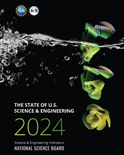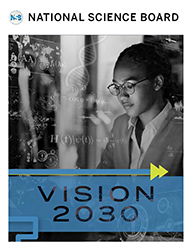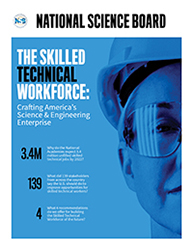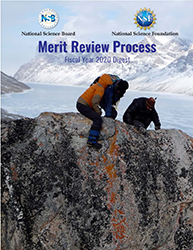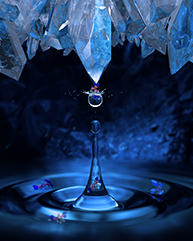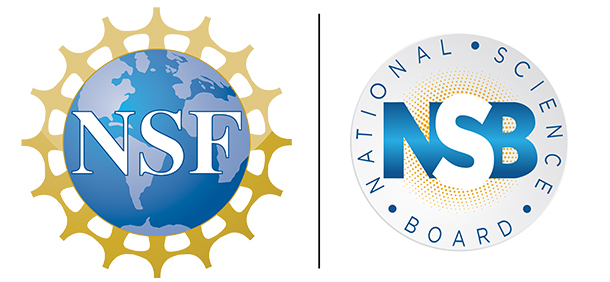
NSF's National Science Board announces new leadership for 2018-2020
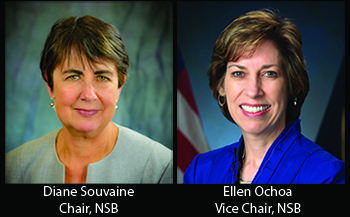
NSB leadership (Credit and Larger Version)
May 3, 2018
Computer scientist Diane Souvaine will be chair and research engineer and former astronaut Ellen Ochoa will serve as vice chair
Today, the National Science Board (NSB, Board), the governing body of the National Science Foundation (NSF) announced a new chair and vice chair to lead the Board for the next two years. The Board elected Diane Souvaine, professor of computer science and adjunct professor of mathematics at Tufts University as its new chair and Ellen Ochoa, director of the Lyndon B. Johnson Space Center as vice chair for the 2018-2020 term. Souvaine replaces former chair Maria Zuber, who rotates off the Board after serving six years and Ochoa replaces Souvaine.
About Diane Souvaine
Souvaine, who has served on the Board for ten years, the last two as vice chair, is on her second term. She has also chaired NSB’s committees on Strategy and Budget, and Programs and Plans, and served as a member of the Board’s Committee on Audit and Oversight, helping provide strategic direction, oversight, and guidance on NSF projects and programs. In addition, Souvaine co-chaired NSB’s Task Force on Mid-Scale Research and served five years on the Executive Committee.
“It’s an honor and a privilege to serve as chair on the National Science Board, a role I take very seriously,” said Souvaine. “NSF is the innovation engine of our country and its support of fundamental research and people fuels our economy, strengthens our national security, and keeps the U.S. competitive on the global stage. I look forward to continuing to work with Congress, the administration, the science and education communities, and the director and her staff to ensure NSF’s pursuit of grand visions and revolutionary ideas that result in unexpected advances for our society.”
Souvaine has been a member of the Tufts University faculty since 1998. She served as Vice Provost for Research from 2012-2016, Senior Advisor to the Provost from 2016-2017, and Chair of the Department of Computer Science from 2002-2009.
Souvaine’s research contributions range from solving challenging problems in computational geometry to practical application across disciplines. Her work extended the results of straight-edged computational geometry into the curved world. Visibility, triangulations and geometric graphs represent another focus of Souvaine’s research as does the application of computational geometry to statistics. Her research led to consulting engagements with corporations such as Exxon Chemical Research, IBM and Pfizer.
Prior to Tufts, Souvaine was a member of the Rutgers University faculty for 12 years. During her tenure at Rutgers, she served for 2.5 years in the Directorate of NSF’s Science and Technology Center for Discrete Mathematics and Theoretical Computer Science (DIMACS), a groundbreaking academic/industry collaboration of Princeton, Rutgers, Bell Labs and Bellcore. DIMACS is tasked with both the theoretical development of mathematics and computer science and their practical applications.
In addition to her scientific and policy contributions, Souvaine is dedicated to increasing diversity and advancing women and underrepresented groups in mathematics, science, and engineering and works to enhance pre-college education in mathematics and computational thinking.
Souvaine is a Fellow of the American Association for the Advancement of Science (AAAS) and of the Association for Computing Machinery (ACM), and was a 2005-2006 Fellow of the Radcliffe Institute for Advanced Study. Among many other accomplishments, she was the recipient of the 2008 Lillian and Joseph Leibner Award for Outstanding Teaching and Mentoring.
About Ellen Ochoa
Ochoa is an experienced astronaut, having served as a crew member on four space shuttle missions in a variety of roles including leading onboard scientific activities, operating the robotic arm, and serving as flight engineer during the launch, rendezvous, and entry phases of the mission. Prior to being named Center Director, Ochoa was deputy center director for five years; she previously led the Flight Crew Operations Directorate, managing the astronaut office and the aircraft operations divisions.
“I am honored to serve as the National Science Board’s vice chair and especially delighted to team up with Diane Souvaine,” said Ellen Ochoa. “I look forward to working with the Board and Director Córdova to advance NSF’s vital national mission.”
As the first Hispanic female astronaut, Ochoa has given more than 300 presentations focusing on the importance of a science, technology, engineering and math education. She has six schools named after her, several books written about her for the K-8 grades, and has been profiled in textbooks and on websites geared toward encouraging females and minorities to pursue technical fields. She is the recipient of many awards including NASA's highest award, the Distinguished Service Medal, honorary doctorates from The University of Pennsylvania, The Johns Hopkins University and Worcester Polytechnic Institute, and the Presidential Distinguished Rank of the Senior Executive Service.
Ochoa began her career as a research engineer at Sandia National Laboratories and NASA Ames Research Center. She has three patents in the area of optical information processing and numerous publications in technical journals. She is a fellow of the American Institute of Aeronautics and Astronautics (AIAA), the American Association for the Advancement of Science (AAAS) and the National Academy of Inventors (NAI).
Ochoa serves on several boards and currently chairs the Nomination Evaluation Committee for the National Medal of Technology and Innovation. She served for years on the Stanford University Board of Trustees, and was a member of the Stanford’s School of Engineering Advisory Council and Aeronautics and Astronautics Department Visiting Committee.
Souvaine and Ochoa will officially assume their respective NSB roles on May 11, 2018.
About the National Science Board
The National Science Board and the National Science Foundation's Director jointly head NSF. NSB identifies issues critical to NSF's future and establishes the Foundation's policies. The NSB also provides the President and Congress with Science and Engineering Indicators, a biennial report on U.S. progress in science and technology. Members are appointed by the President for six-year terms and selected for their eminence in research, education and records of distinguished service.
Media Contact
Kim Silverman, National Science Board, (703) 292-4515, ksilverm@nsf.gov
Useful NSB Web Sites:
Home Page: http://www.nsf.gov/nsb
Media Contact: http://www.nsf.gov/staff/staff_bio.jsp?lan=nlymn&org=NSF
News: http://www.nsf.gov/nsb/news
Meetings: http://www.nsf.gov/nsb/meetings
Publications: http://www.nsf.gov/nsb/publications
Facebook: https://www.facebook.com/NationalScienceBoard
Twitter: Twitter: https://twitter.com/intent/user?screen_name=NSF_NSB
YouTube: https://www.youtube.com/channel/UCkrHRzuGSrPp2haQs0T_Pww
To view PDF documents, please download Adobe Acrobat Reader.
